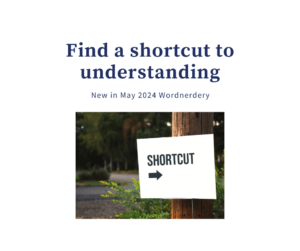 The easier we make it to read what we write, the more people actually will read it. Even more important, they’ll understand and remember it.
The easier we make it to read what we write, the more people actually will read it. Even more important, they’ll understand and remember it.
That’s a key part of plain language: Helping readers find what they need; understand what they find; and use what they find to meet their needs.
Some of my clients ask me to edit their documents to make them easier to read, and here’s one fast fix: Replace multisyllable words with short, familiar, skimmable ones.
In the May issue of my newsletter, Wordnerdery, I share a list of just some of the 300+ words I’ve suggested my clients simplify. More readable words include using “fix” instead of “rectify,” “agree to” instead of “acquiesce” and “if” instead of “providing.”
Read more in May Wordnerdery.
What wordy writing have YOU run across? Have you found it hard to convince a reviewer that simple is better? Tell me about it in the comments or drop me a line.
Wordnerdery is a quick read about words, effective/expressive writing, newsletters and more. Are you a subscriber yet? If yes, thanks for reading! If not, you can sign up right now. In keeping with Canadian and American anti-spam laws – and just plain good manners – you can easily unsubscribe any time.
Related reading:
A roundup of my posts on readability

I completely resonate with this! Simplifying language really makes a difference in how people engage with information. In digital signage, I’ve seen firsthand how shorter, clearer words lead to better understanding and retention. It’s surprising how often we come across unnecessarily complex language. Do you find certain industries are more resistant to this kind of simplification?
Not to pick on lawyers, but lawyers.
Haha, lawyers do have a magical ability to turn “yes” into a 10-page essay! But hey, maybe they’re just giving us all a masterclass in word count goals? If only they’d take a few notes from this blog and turn “notwithstanding” into “despite.” Could save us all a few headaches (and legal fees)! ?